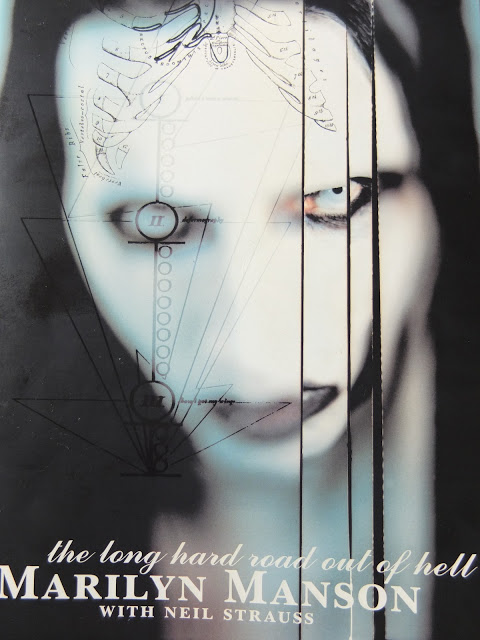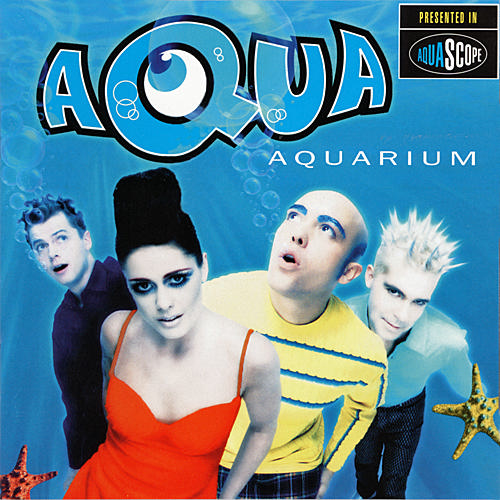 It is generally agreed that Marilyn Manson’s phenomenon is more interesting than Marilyn Manson’s music. If you yourself agree, you may want to read this book, which is all phenomenon and zero music.
It is generally agreed that Marilyn Manson’s phenomenon is more interesting than Marilyn Manson’s music. If you yourself agree, you may want to read this book, which is all phenomenon and zero music.
Published in 1998, shortly before the release of Mechanical Animals, it tells the story of a young boy called Brian Warner, who escaped a childhood of decorum and religion, embraced drugs and satanism, and — after a failed writing career — found his true calling in music (to torture a Clive Barker quote, writing is masturbation, while playing in a band is an orgy). Somewhere along the way he has an epiphany: there there were worse things than being rejected by the cool kids. Being accepted by the cool kids, perhaps. Like Antichrist Superstar, this book has three parts, and with the final part documenting the aforementioned album’s creation and the beginnings of nationwide controversy.
I don’t hate Manson, but I don’t pity him, either. Yes, he was subject to many defamatory attacks, and he was blamed for many things that weren’t his fault…but he has profited handsomely from the controversy, too. He sure as fuck didn’t become the most famous rockstar in America because his music was good.
The book was co-written with Neil Strauss, who is a talented writer — relentless at paring away the rind and getting straight to the interesting parts. If Strauss was a DVD player he’d skip over the movie’s opening credits, start you in the middle of the first action scene, and fast forward through all the dialogue at 3x speed. Reading his books can be exhausting because he throws so much stuff at you so quickly.
The book is full of interesting moments — Brian describes his run-ins with police, his meeting with Anton Szander LaVey, and provides some affidavits from the American Family Association that make him sound like the worst monster of the 21st century (I’m sure he appreciates this very much). I wish there had been fewer random groupie sex stories, and more about Trent Reznor. For a while it seems the working relationship between the two men is building to something big, but the expected payoff doesn’t occur.
The book finds time for lots of philosophising. The revelation Manson has is that nobody is pure, and that it’s all a charade. The Holy Hannah schoolteacher who kept softcore erotica books in her desk drawer. The much loved uncle who had a huge collection of bestiality porn. Everybody has skeletons in their closet. You will think of the verse from the Bible that talks about tombs: beautiful and whitewashed from the outside, dark and seething with corruption on the inside.
Manson has no filter. He talks shit about records labels, old bandmates, current bandmates, and, most of all, himself. His honesty is appealing. Whether he’s poking fun at Daisy Berkowitz’s stupidity (“hey, this album’s about Jesus going on a rock tour, right?”), or outlining his attempt at murdering at ex-girlfriend, he is always direct and blunt. Despite the outlandish content of Hell, it seems more trustworthy than many biographies I read. If this is the expurgated and censored version of Manson’s life, then I don’t want to know about the things that were left out. Manson has always had things to say, but usually those things dance an awkward two-step to (and with) musical accompaniment. Now, the message is unfettered and free.
 Aquarium — also known as “the album your little sister used to listen to” — makes no attempt at disguising what it is. It’s not varied, or subtle, or smart. It grabs hold of a single working formula (fun danceable bubblegum pop) and spends forty minutes mugging it in a dark alley.
Aquarium — also known as “the album your little sister used to listen to” — makes no attempt at disguising what it is. It’s not varied, or subtle, or smart. It grabs hold of a single working formula (fun danceable bubblegum pop) and spends forty minutes mugging it in a dark alley.
The songs are simple but very tightly constructed, with production as light and airy as spongecake. Lene Nystrøm’s voice has a strange but not unpleasant tonality to it, her voice sounds like that of a talented singing alien. Male vocalist René Dif exists mostly as a foil to Nystrøm’s voice. He could never carry a song on his own, but his back-and-forth exchanges with the female vocals are fun and energetic.
Aqua songs are very catchy. The melodies have a tendency of entering your head and kind of barricading themselves in there, Rorke’s Drift style — armies of Zulus may be needed to dislodge them. “Barbie Girl” is the most famous track (Blender or someone referred to it as “Scandi-Wegian pedo pop”) but “Doctor Jones” and “My Oh My” are also very good. “Be a Man” is boring, but “Turn Back Time” brings the album to a new level of class (ie, any level of class). You’d be ashamed to listen to the rest of this album in mixed company, but “Turn Back Time” sounds mature and sophisticated.
For the most part, the album is full of childish nursery-rhyme lyrics are both adorable and entertainingly creepy. There’s a fair few double-entendres here and there, no doubt an adult could fit his or her own experiences to the words.
Still, the album was clearly written with a particular age range in mind. “Heat of the Night” has Rene Dif confiding “the tequila is here” in an aren’t-I-scandalous voice. So, he brought tequila. I wonder what else he brought that we can’t tell mom and dad about. Alcoholic chocolates shaped like hearts? Stripped by Christina Aguilera…the UNCENSORED version? Plainly, shit is about to go down.
Aquarium is very embarrassing but I think it survives better today than Drake or Pitbull’s albums will in 15 years. It’s catchy, and relatively free of annoying 90s gimmicks. If you want the manly version of this album, acquire I Get Wet by Andrew WK, which is 95% the same but has loud guitars.
 They say nobody should write books about war. The ones who weren’t there will never understand, and the ones who were there remember everything with the most brilliant hindsight a man can have.
They say nobody should write books about war. The ones who weren’t there will never understand, and the ones who were there remember everything with the most brilliant hindsight a man can have.
Tigers in the Mud is the combat memoirs of German tank commander Otto Carius. Rejected twice from the Wehrmacht for being underweight, Carius rose to become one of the most deadly men of World War II, credited with over 150 tank kills. He was awarded the Knight’s Cross, to which Himmler would affix the Oak Leaves in 1944. He served on multiple fronts, fighting “Ivan” in the east and then American soldiers crossing the Rhine. This is his story: WWII from behind the 88mm cannon of a Tiger.
Carius describes the legendary Tiger I with something like awe and something like love. They were the German answer to the Russian T34, huge, ugly, but not without some inner grace. Controlling them was easy (“It drove just like a car”, Carius says), and they could make 45kph on a road and 20kph cross-country. They packed massive firepower. Carius describes stunts such as letting an enemy hide behind a house, and then shooting them straight through the house’s walls.
It’s not all about tanks, it’s also about people, and Carius acclaims the men he fought beside (and under). He seems eager to emphasise the patriotism and camaraderie of the Wehrmacht at the front line, and says that nobody was forced into battle. Some men were Nazis, some opponents of Nazis, some motivated by nothing more political than the glory of their homeland.
Some parts are nail-biting, like when a stiff-necked Oberst orders Carius to advance into a deathtrap. Carius ends up shot once in the forearm, four times in the back, and once in the neck at point blank range.
Some parts are downright bizarre. It seems German administration was lax at writing documentation for the Tiger I. The Russians, however, published excellent guides on the Tiger I’s strengths and weaknesses. The result was a surreal process where German tank drivers had to learn about their own tanks using captured enemy literature.
Carius tells in detail of his meeting with Heinrich Himmler, who is described as calm and friendly. Himmler offers Carius a place in the Waffen-SS, which he declines. Then, in another bizarre scene, Himmler asks if Carius has seen the sights of the city, and gives him a car to go joyriding through Salzberg. The war is winding down at this point, and soon Carius tells of less happy things: the grim conditions of American prison camps where, he says, the Yankees set about proving that they were worse than the Germans. A quote stands out: “peace is hell.”
Carius was a gifted soldier but only an average writer, which is better than the alternative. Had he been a gifted writer but an average soldier he likely would have been killed, which poses great difficulties if you want to write a book.
Nevertheless, I wish there was more detail, and more elaboration. There are many amazing things in this book, but alas, we see them only as sketches. One example is found in the book’s early pages. Carius describes a tank tipping over while falling off a ramp. What happened next? How do you get a sixty ton tank back upright? Who’s job was that in the army? How badly damaged was the tank? I wish he had gone a bit deeper into some things. Tigers in the Mud is a fascinating tour through WWII, but it is a rushed one, and gunsmoke sometimes obscures the view.
 It is generally agreed that Marilyn Manson’s phenomenon is more interesting than Marilyn Manson’s music. If you yourself agree, you may want to read this book, which is all phenomenon and zero music.
It is generally agreed that Marilyn Manson’s phenomenon is more interesting than Marilyn Manson’s music. If you yourself agree, you may want to read this book, which is all phenomenon and zero music.

